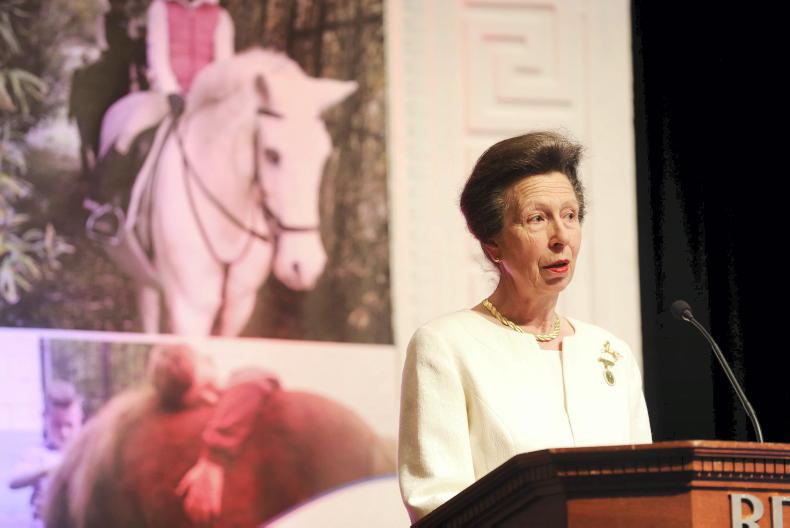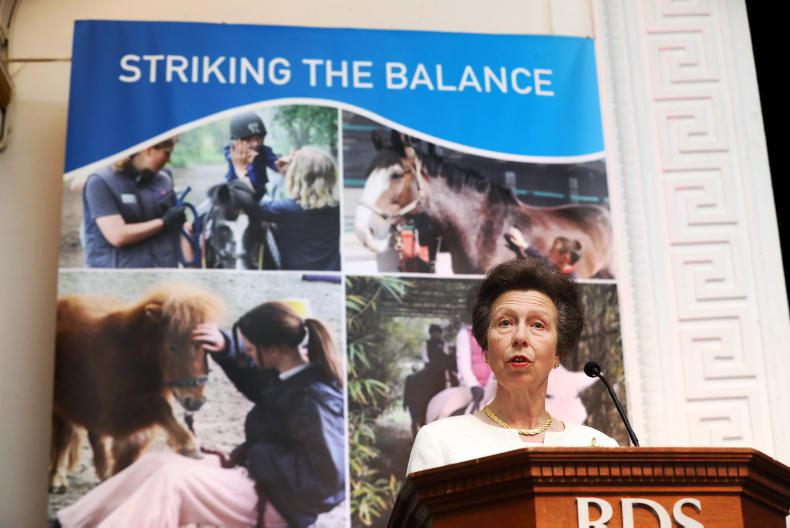HRH THE Princess Royal has been president of World Horse Welfare since 1994, and she was in attendance at their Conference 2021 held recently in the Royal Geographical Society in London. Passionate about the issue of welfare, and an acclaimed equestrian in her own right, she delivered a short but very pointed closing address.
The theme of the day was ‘whose opinions matter?’ and Princess Anne got straight to the point when she said that “opinions don’t come with responsibility”. Referring to the work of the WHW founder, Ada Cole, she pointed out that she used opinions for the betterment of working horses, and remarkably her opinions were backed up with evidence at a time when there was no technology.
Princess Anne said that we must “take pride in the relationships we have with horses from birth to death”, stressing that responsibility doesn’t go away. Returning to a topic she has addressed previously, she noted that the loss of abattoirs is an issue still, as too is that of transport.
“It is important to see horses holistically,” she concluded.
During a coffee break The Princess Royal took time to meet small groups of attendees. The final group consisted of three media representatives, including this columnist. Recalling her visit to the Dublin Horse Show, she said it was a hugely enjoyable experience, and one she would hope to repeat. During that visit she spent time in the ring watching the Breeders’ Championship sponsored by The Irish Field.
We help them, but they help us
THE late Sir Peter O’Sullevan was a long-time supporter of the work of World Horse Welfare, formerly the International League for the Protection of Horses.
His charity continues to help and the opening speaker at the conference was Nigel Payne, chair of the trustees of The Sir Peter O’Sullevan Charitable Trust.
“We help them, but they help us” was one of Payne’s messages, referencing, among other things, their importance in the area of mental health. Addressing representatives from many bodies associated with thoroughbreds and non-thoroughbreds, he was unequivocal when saying that “the horse must come first”.
He was followed by World Horse Welfare’s chairman, Michael Baines, who outlined the purpose of this year’s conference, which asked the question “whose opinion is setting the agenda?” The day drew together experts to share opinions, learn and be well informed.
Roly Owers is chief executive of World Horse Welfare and he, as ever, spoke with passion and conviction about the issues facing our industry and sport.
The problem is when uninformed opinion gains traction, especially on social media platforms, and he asked if uninformed opinion really matters? The answer, he suggested, is that it does.
He pointed to a number of specific issues that had caught the attention of the public, resulting in unsatisfactory outcomes.
One was the vitriol directed at a vegan contestant on the Great British Bake Off who rode horses, while he decried the recent suggestion that horses should be replaced in the modern pentathlon at the Olympic Games.
Good filters needed for social media
PAMMY Hutton, the well-known and respected dressage rider and trainer, doesn’t hold back when she has something to say. In her presentation she outlined some of the causes that she has taken issue with over the years, and they include many that all horse lovers will understand.
Doping in eventing, abuse in the collecting ring and especially the use of Rollkur, tight nosebands, electric spurs, heavy riders on unsuitable horses, the overuse of whips, the call to ban Tennessee Walking horses and the proper use of humane euthanasia. All of these causes are “driven by love of the horse,” said Hutton.
Much discussion took place about social media, the snowflake generation, online bullying and most speakers throughout referenced this. ITV Racing’s lead presenter Ed Chamberlin made some relevant points in his address, and suggested that we all “need good filters for social media. Things are never as bad as you think they are”.
In terms of the television coverage, he spoke about some of the thinking behind the approach to presenting the sport. While they often attract audiences of 800,000 and more, Chamberlin said it was his belief that about 80,000 were racing aficionados.
Presenting the sport on television was a form of entertainment, and “while we try to have something for everyone, it is impossible to please all”.
He raised thorny issues such as Cheltenham going ahead in spite of Covid, the Gordon Elliott photograph and the Panorama programme. In terms of dealing with these, and other matters such as drugs and the whip, “racing needs to be on the front foot and proactive where possible, and not simply reactive”.
Not cool
In a question and answer session, Sky Sports editor Nick Powell gave some wise advice when it comes to posting on social media. They included being careful about what you post, that it is not cool to be first with something and then be proven wrong, and don’t read Twitter before bed.
Pammy Hutton said that we ignore social media at our peril. “Monitor the tone of the discussion and then offer a reasoned opinion. Ignore the abuse and it is important to listen,” she opined.
Former World Horse Welfare groom Jordan Headspeath gave a telling account of her online experience of posting an innocuous 12-second video, and the subsequent rush to judgement of tweeters. It was a lesson in how something innocently posted or said could attract abuse.
Agonising too much about the outliers
BETTER humans, better horses was a theme of the talk from performance psychologist Charlie Unwin, a modern pentathlete in a previous life. He spoke about how humans driven by ambitious goals need to be aware of their impact on horses.
Unwin delivered some key life lessons, speaking about self-esteem and self-belief.
“We make ourselves vulnerable to outside criticisms because 90% of feedback comes from inside our own heads,” he told the gathering.
He made a call for everyone to collaborate more, and to be compassionate, adding that psychology and mental training needs to be proactive. “Don’t ignore what you can’t control, just be aware of it and then learn to park it.”
The final panel discussion included BBC Radio 2 presenter and World Horse Welfare patron Sara Cox and Chris Tufnell, both of whom offered some simple but important warnings and advice on the use of social media.
Tufnell warned that “we agonise too much about the outliers, and we also have a lot of the converted. We need to focus on those in-between”. Cox advised everyone to avoid asking for opinions on social media.
Another panel member, Neil Hudson, tellingly said: “Social media can be for good; don’t blame the tool. After all, a knife cuts a tomato and it can also kill”.
Collaboration
With some 50 organisations gathered for the conference, the importance of collaboration was again stressed. People inside and outside the industry care about the horse, and this must be kept at the heart of everything. It is important to listen to concerns that are raised, while the use of archaic language such as “breaking horses” should be changed.




 This is a subscriber-only article
This is a subscriber-only article
 It looks like you're browsing in private mode
It looks like you're browsing in private mode











SHARING OPTIONS: